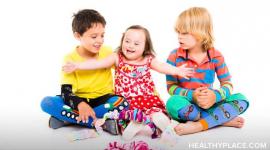Persecution Complex: Does Your Kid Feel Like a Victim?

Persecution complex - when your child feels like he/she is always the victim. How to help your child deal with the persecution complex? Find out here.
Parents write: Is there such a thing as a child having a "victim complex?" Our preteen son often views the world in terms of what others are doing to him or what he is not getting. As much as we try to convince him otherwise, he still persists. What should we do?
Why Some Children Have a Persecution Complex
Children with Consistently Negative Perceptions
All of us perceive events with some degree of subjectivity. Our background experiences, personality, and present circumstances cause some "perceptual blurring." When these factors create a persistent pattern of narrow interpretations, such as overly trusting or mistrusting attitudes, the results can be emotionally and socially costly. This is especially true of children since they don't have the same freedom to avoid those people or situations that trigger such slanted perceptions.
Those children who view themselves as the consistent victim of events around them tend to behave in ways that fulfill these negative perceptions. Relentless arguing one's point, stubborn refusals to consider alternate explanations, and spiteful efforts to "punish" nonbelievers can turn family life into a daily debate over facts and fantasy. Parents soon run out of patience, reacting in ways that augment the child's self-defeating beliefs.
Working with Children's Perceptions to Lessen Persecution Complex
Here are some strategies to help rebalance a child's perceptions and bring relief to a child with a persecution complex:
Don't try to change your child's perceptions when emotions are at their peak. If your child is in the throes of protesting about yet another grievance, it is best to listen and answer in a nonjudgmental manner. Later, after the emotions have subsided, begin a discussion about how people misinterpret events around them. Offer examples of how it happens to adults and see if they can open their mind to that possibility. If so, explain how everyone looks at things in life a little differently than others and that when people see similar bad things over and over again it's time to consider that maybe they are misinterpreting. Suggest they begin to ask themselves the following question after something bad happens to them: "Is there another way of looking at this other than that I always have bad things happen to me?"
Consider the possibility that some intrinsic limitation, such as a learning disability or processing delay, is placing pressure upon a child's perceptions of fairness and equality. Children with learning or other issues have more difficulty navigating within the world of expectations and consequences. Rather than appreciate how these limits may be producing such difficulty, they may project blame for those difficulties upon events and people around them. Educating them about their "learning or listening differences," and teaching them how to advocate for themselves, may make them less prone to view life as a victim.
Address those sources that may be continuing to fuel your child's perceptions. Unresolved jealousy of a sibling, untenable pressures at home, school, practice, or within the community, or past traumas may be contributing to these narrow views. If so, give your child the freedom to talk about these circumstances and develop an action plan to correct, or at least minimize, the adverse impact.
Look for opportunities to point out when favorable outcomes occur. Children with these propensities are not especially cognizant of such events because they do not confirm their belief system. Parents can help by "mentally highlighting" the good things that happen and suggesting that the child store some of these for times of disappointment. Such a "good time reserve tank " can also be documented for future reference.
APA Reference
Richfield, S.
(2019, August 5). Persecution Complex: Does Your Kid Feel Like a Victim?, HealthyPlace. Retrieved
on 2025, December 27 from https://www.healthyplace.com/parenting/the-parent-coach/children-with-a-persecution-complex-when-your-child-feels-like-a-victim



